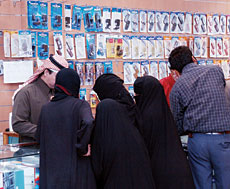JEDDAH, 17 December 2004 — Saudi Arabia will overturn a ban on the import and sale of mobile camera phones in the Kingdom, press reports said yesterday.
Although widely used across the country, camera phones are illegal in the Kingdom. In many cases the phones have been used to invade privacy, particularly of women, prompting fights at markets, wedding halls, schools and other public places as well as triggering family disputes.
Local papers quoted unnamed sources as saying the authorities had asked the Ministry of Interior to put in place regulations to prevent the negative use of the camera equipment in the phone.
Body search is a common practice in universities for all female students to ensure they don’t carry camera phones. Girls, however, find ways to hide the devices and bring them to lecture rooms. In wedding halls, some operators have resorted to hiring special search squads to check every invitee to ensure they leave their camera phones out of the hall.
Officials were not immediately available to comment on the report on lifting the ban on camera phones.
Earlier, four ministries — interior, commerce and industry, communications and information technology, and finance — had separately asked for mobiles with cameras to be permitted. The ministries submitted requests to the royal court for cellular phones with cameras to be permitted. They based their requests on the fact that camera phones are a technological achievement equal to television and the Internet.
After a slew of highly publicized incidents in the Kingdom involving the misuse of camera phones, a committee was set up by various ministries to look into the problem. The committee has recommended that camera-equipped mobile phones be allowed even if they have been abused.
Mobile users welcomed the move saying within a few years it could be impossible to ban the import of camera phones since manufacturers plan to produce only camera phones in future doing away with the dual system of today.
Women were especially enthusiastic about the move. “We cannot remain behind. The new technology is available to everybody and we should not be denied it, just because some of us use it to harm others,” said Monia Faiz.
Noha Muhammad agreed: “Even if camera phones were banned, people will find other ways of taking unlicensed photographs, so there is no point in banning it anyway.”
Lama Yassin disagreed saying she does not favor the use of camera phones, saying people would continue abusing the phones. “I was with the banning and still feel that we should not allow these phones. We have people here who can abuse any new device, and we should not allow them to do that. But if we cannot control them all the way, the least we can do is ensure that in public places and social gatherings people should not be allowed to use cameras, to protect other people’s privacy.”
“Do we expect international companies to manufacture mobiles especially for Saudi Arabia?” asked a source at a major mobile phone company.
The ban has only led to the emergence of a flourishing black market. People are already buying mobiles with cameras from outside the Kingdom. Eighty percent of companies manufacturing cellular phones are moving toward installing cameras in their phones, in addition to other features.
Sources at mobile markets said they expect a formal decision on lifting the ban to be issued within a few days. Traders said the move would lead to a boom in the sale of mobile phones to more than five million units annually at the cost of SR5 billion ($1.33 billion).
Those against the ban called for implementing punishments against individuals found to misuse mobile cameras instead of enforcing a ban that affects everyone.
The Kingdom imports around six million mobile phones a year, with 70 percent of consumers regularly changing their mobiles, something that has greatly boosted demand.
Competition in the mobile phone market is expected to intensify with the coming to the market of a new competitor to the Saudi Telecom Company which until now has been dominating both the mobile and land phone markets.
Ettihad Etisalat which won the second mobile phone service license said it expects to get up to seven million subscribers in the first five years of its operations in the Kingdom.
Company officials said they expect Etisalat to start its services in the Kingdom from early next year. The company would provide advanced services to its subscribers including third generation mobile phone technologies enabling the subscriber to receive TV telecasts, in addition to transmission of pictures and other proactive services.


